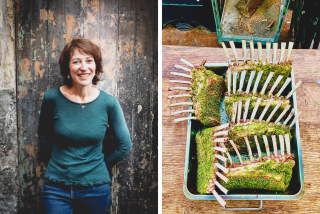FRANCE : Gastronomes’ Goose Is Cooked : Transport strike sends sales of holiday favorite foie gras plummeting. Animal activists cheer as food emporiums suffer.
- Share via
PARIS — Ah, lovely Noel, France’s gastronomic holiday of the year. ‘Tis the season for the simple glory of foie gras, melting delectably on rigid pieces of toast.
Or at least it’s supposed to be.
But the French seem to have lost their appetite for fatted goose and duck liver. The just-ended transport strike sent foie gras sales plummeting by 70%, a statistic verified by the glum looks at Fauchon, Paris’ best-known food emporium, where the delicacy sells for $100 to $200 a pound.
So why is Andree Valadier smiling as she sits in her small office across town?
“We are very happy, very happy,” she said. “This is such good news.”
To Valadier, president and founder of the National Society for the Defense of Animals, the holiday season has always been a horror. It means more ducks and geese will be force-fed corn to enlarge their livers--paying, she says, a “scandalous” price for the French addiction to the good life.
“There is just too much foie gras,” she said. “And what is it, really? It’s just fat. A sick, enlarged liver. You might as well just eat butter. It’s ridiculous.”
In the past, Valadier’s association has campaigned against foie gras, buying advertising space to feature graphic pictures of force-fed birds.
But this year, with foie gras sales at their lowest level in decades, she and her compatriots are saving their money. The transport strike has held up mail orders and prevented people from getting to foie gras specialty shops, saving the lives of gaggles of geese as well.
To be sure, Valadier is in the minority in her country. But, increasingly, animal activists in Europe are complaining about the eating habits of the French.
French consumers, as some argue, may be becoming more morally conscious, but when it comes to food, animal rights are the furthest things from their minds.
A few weeks ago, the problem was pigeons. Animal protection groups in the Dutch town of Zwolle complained loudly when the city caught and sold 2,000 pigeons to pate manufacturers in France, where pigeon graces many of the best menus.
*
Earlier this year, the problem was veal, another French favorite. Much of the veal served here comes from Britain, and animal rights activists there tried to stop trucks carrying veal calves to France. One activist was run over and killed by the convoy. Although the veal trade continues, the French reluctantly agreed to more restrictions on veal transport.
Despite the foie gras sales slump, the usual holiday advertising blitz is much in evidence. Le Figaro, a Paris daily newspaper, devoted an entire page to such weighty matters as: whole livers versus foie gras blocks; duck versus goose; and artisanal preparation, or small-scale production, versus industrial methods.
About 20 million pounds of foie gras is produced annually in France, and most of it is consumed here, although the United States is the largest export market.
Foie gras, now produced in eastern and southwestern France, has been around for centuries. It was elevated from ordinary goose liver, eaten by peasants, to the tables of royalty by a Strasbourg chef in the 18th century. Louis XVI was an early fan, easing the years before he went to the guillotine by adding it to his diet.
Today, Jean-Claude Crochard, Fauchon’s commercial director, waxes poetic about foie gras, which usually accounts for nearly a third of his holiday season sales.
“Foie gras,” he said, “is a miracle for we French. It goes with Christmas. It goes with holidays. It goes with celebrations. It is always good news.”
The beef of animal rights activists is that, to produce foie gras, farmers force-feed corn into the geese and ducks for weeks until the livers grow to five to 10 times their normal size.
But animal rights groups are no match for the French agricultural lobby.
“The French are susceptible to the propaganda of the producers,” Valadier said. “They say the animals don’t suffer, but they are lying. If the French people knew, I am sure they wouldn’t eat foie gras.”
But the supreme pleasure of eating foie gras may be just too strong for the French to resist. In fact, the French demand for all manner of meat, although diminished somewhat by health concerns, remains strong. And that means animals have to die.
“What are we supposed to do?” asked Crochard of Fauchon. “Stop eating beef? Stop eating fish? Do we have to ask a cauliflower if we hurt it when we cut its tail? Pretty soon, we’d be eating nothing.”
Even without foie gras on the French table this year, Valadier knows she can’t stop the general gluttony that the Yuletide brings.
“Everyone eats too much at Christmas,” she said. “We eat well all year; there’s no reason to eat more. But we will eat next week until we are sick. And the animals will suffer.”
More to Read
Sign up for Essential California
The most important California stories and recommendations in your inbox every morning.
You may occasionally receive promotional content from the Los Angeles Times.














